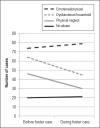Adverse childhood experiences and psychosocial well-being of women who were in foster care as children
- PMID: 24355905
- PMCID: PMC3783064
- DOI: 10.7812/TPP/12-121
Adverse childhood experiences and psychosocial well-being of women who were in foster care as children
Abstract
Background and objective: Research has shown that many children in foster care later have psychosocial problems as adults; this is often attributed to cumulative adversities and a lack of supportive caregivers. The risk factors associated with foster care, such as maternal separation and multiple placements, often counteract many protective factors that can ameliorate the effects of childhood adversities. This study assessed the relationship between adverse childhood experiences (ACEs) and psychosocial well-being in women who were in foster care as children.
Methods: A total of 101 women aged 18-71 years (mean, 36.83 [12.95] years) completed an anonymous online survey based on the 10-item ACE Questionnaire, the Sense of Coherence questionnaire, and the General Health Questionnaire.
Results: More than 56% of respondents were identified as experiencing current psychological distress. Sense of coherence scores (mean, 54.26 [15.35]) showed a significant inverse association with both General Health Questionnaire (mean, 14.83 [5.88]) and ACE (mean, 5.68 [2.90]) scores (r = -0.64 and -0.31, respectively) and 97% reported at least 1 ACE, 70% reported ≥ 5 and 33% reported ≥ 8. Linear regressions indicated that ACEs reported to occur before foster care were associated with lower levels of sense of coherence (8%) and higher levels of psychological distress (6%). Physical neglect and living in a dysfunctional household (parental loss, maternal abuse, or household member associated with substance abuse or prison) significantly decreased during foster care by 16 and 19 percentage points, respectively. Rates of emotional and physical abuse did not change.
Conclusion: The number of ACEs was associated with the level of psychological distress. Our findings suggest that children entering the foster care system are already vulnerable and at risk of experiencing ACEs during foster care and psychological distress during adulthood. Measures implemented to protect children must not cause more harm than good. Social services that preserve and strengthen the family unit and reduce the number of ACEs both before and during foster care are recommended. Social workers and clinicians who are trained to address and manage the unique developmental needs of children in foster care may help reduce the effects of ACEs and optimize developmental health.
Figures
Similar articles
-
Adverse childhood experiences among children placed in and adopted from foster care: Evidence from a nationally representative survey.Child Abuse Negl. 2017 Feb;64:117-129. doi: 10.1016/j.chiabu.2016.12.009. Epub 2017 Jan 10. Child Abuse Negl. 2017. PMID: 28086178
-
Adverse Childhood Experience histories in foster parents: Connections to foster children's emotional and behavioral difficulties.Child Abuse Negl. 2020 Jun;104:104475. doi: 10.1016/j.chiabu.2020.104475. Epub 2020 Apr 6. Child Abuse Negl. 2020. PMID: 32272339
-
Growing up with parental alcohol abuse: exposure to childhood abuse, neglect, and household dysfunction.Child Abuse Negl. 2001 Dec;25(12):1627-40. doi: 10.1016/s0145-2134(01)00293-9. Child Abuse Negl. 2001. PMID: 11814159
-
Practitioner review: Children in foster care--vulnerabilities and evidence-based interventions that promote resilience processes.J Child Psychol Psychiatry. 2012 Dec;53(12):1197-211. doi: 10.1111/j.1469-7610.2012.02594.x. Epub 2012 Aug 6. J Child Psychol Psychiatry. 2012. PMID: 22882015 Free PMC article. Review.
-
Trauma-Informed Care for Youth in Foster Care.Arch Psychiatr Nurs. 2016 Jun;30(3):439-46. doi: 10.1016/j.apnu.2016.01.007. Epub 2016 Jan 13. Arch Psychiatr Nurs. 2016. PMID: 27256954 Review.
Cited by
-
Interventions for pre-school children in foster care: A systematic review of randomised controlled trials of child-related outcomes.JCPP Adv. 2024 Sep 5;5(1):e12273. doi: 10.1002/jcv2.12273. eCollection 2025 Mar. JCPP Adv. 2024. PMID: 40059998 Free PMC article.
-
Psychometric properties of the Adverse Childhood Experiences Questionnaire 10 item version (ACE-10) among Hungarian adolescents.Front Psychol. 2023 May 19;14:1161620. doi: 10.3389/fpsyg.2023.1161620. eCollection 2023. Front Psychol. 2023. PMID: 37275710 Free PMC article.
-
High-level psychotropic polypharmacy: a retrospective comparison of children in foster care to their peers on Medicaid.BMC Psychiatry. 2021 Jun 10;21(1):303. doi: 10.1186/s12888-021-03309-9. BMC Psychiatry. 2021. PMID: 34112146 Free PMC article.
-
Sexual risk behaviors and the legacy of colonial violence among Northern plains American Indian youth: A mixed methods exploratory study.Soc Sci Med. 2020 Aug;258:113120. doi: 10.1016/j.socscimed.2020.113120. Epub 2020 Jun 13. Soc Sci Med. 2020. PMID: 32574888 Free PMC article.
-
Secondary analysis of retrospective and prospective reports of adverse childhood experiences and mental health in young adulthood: Filtered through recent stressors.EClinicalMedicine. 2021 Aug 19;40:101094. doi: 10.1016/j.eclinm.2021.101094. eCollection 2021 Oct. EClinicalMedicine. 2021. PMID: 34746715 Free PMC article.
References
-
- Wilkinson RG. The impact of inequality: how to make sick societies healthier. New York, NY: The New Press; 2006. Sep 1,
-
- Zeanah CH, Keyes A, Settles L. Attachment relationship experiences and childhood psychopathology. Ann N Y Acad Sci. 2003 Dec;1008:22–30. DOI: http://dx.doi.org/10.1196/annals.1301.003. - DOI - PubMed
-
- Bowlby J. Attachment and loss, vol 2: separation: anger and anxiety. London, UK: Pimlico; 1998.
-
- Najjar F, Weller RA, Weisbrot J, Weller EB. Post-traumatic stress disorder and its treatment in children and adolescents. Curr Psychiatry Rep. 2008 Apr;10(2):104–8. DOI: http://dx.doi.org/10.1007/s11920-008-0019-0. - DOI - PubMed
-
- Perry BD, Szalavitz M. The boy who was raised as a dog and other stories from a child psychiatrist’s notebook: what traumatized children can teach us about loss, love, and healing. New York, NY: Basic Books; 2006.
MeSH terms
LinkOut - more resources
Full Text Sources
Other Literature Sources
Medical
Miscellaneous


